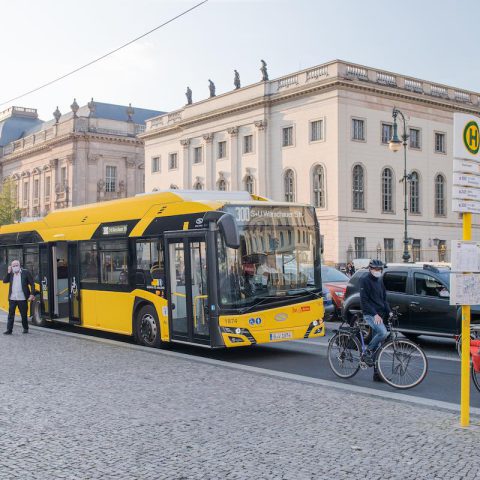German e-buses now have a sound: VDV presents an acoustic industry standard
Eager to hear how electric buses will sound in Germany? The VDV has presented an acoustic industry standard in Berlin, following the student competition launched in late 2021 in cooperation with the FOAM Institute Berlin. Winner? Lukas Esser from the Berlin University of the Arts. CLICK BELOW TO HEAR THE VDV ACOUSTIC STANDARD FOR E-BUSES […]

Eager to hear how electric buses will sound in Germany? The VDV has presented an acoustic industry standard in Berlin, following the student competition launched in late 2021 in cooperation with the FOAM Institute Berlin. Winner? Lukas Esser from the Berlin University of the Arts.
CLICK BELOW TO HEAR THE VDV ACOUSTIC STANDARD FOR E-BUSES
“While manufacturers are offering the first vehicle sound generators – AVAS – for electric vehicles, the VDV, the sector and the industry are taking an active step further and setting an acoustic industry standard that is perceived as pleasant, modern and functional by people in the transport environment. It was important for us to involve as many interest groups as possible, such as passenger, transport, visually impaired and environmental associations as well as federal and state transport ministries, from the very beginning. They not only defined the design ideas of the future standard, but also chose the winning idea in the subsequent competition among audio and acoustics students,” says VDV Vice President Werner Overkamp.
A ‘made in Germany’ e-bus sound
E-buses are intrinsically too quiet at low speeds to be noticed in time outdoors and must therefore draw attention to themselves for safety reasons according to the EU standard
“The industry association therefore developed a characteristic e-bus sound ‘Made in Germany’ with partners, which can be heard unmistakably outside the vehicles – for example when approaching and leaving bus stops,” says Overkamp. The Association of German Transport Companies (VDV) had launched a student competition in late 2021 in cooperation with the FOAM Institute Berlin to submit ideas for Germany’s e-bus sound of the future.
“We are now professionally developing the winning idea by Lukas Esser from the Berlin University of Arts together with him. Together with the partners from the industry, the next development steps will then be taken,” says Professor Sebastian Waschulewski from the FOAM Institute: “There is no standard sound so far: the e-bus manufacturers have not yet been intensively active in sound design in order to develop an industry-specific, traffic-safe as well as pleasant sound. Together with the industry association VDV, we have analysed the interests and requirements in this ambitious sound engineering project in order to create a new sound with and for the relevant stakeholders and ultimately to standardise it. The winning sound represents the envisaged acoustic identity for the e-bus, which is characterized by attributes such as unique, environmentally friendly and modern. The winner of the competition has hit the target identity for the e-bus perfectly!”
Rudi Kuchta of the VDV Industry Forum and Senior Vice President MAN Truck & Bus: “It’s about our urban health, it’s about safety and a contemporary driving experience. The work really starts now: in addition to the acoustic fine-tuning, the vehicle hardware must now also be tested and adjusted. There is still some room for manoeuvre for the manufacturers and developers on how to use the sound optimally in everyday life, depending on location, region, speed and operating situation. We are now doing everything we can to be able to present the new e-bus sound at the VDV electric bus conference and the Elekbu trade fair on 12 and 13 July 2022 in Berlin.”








